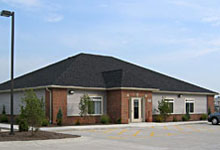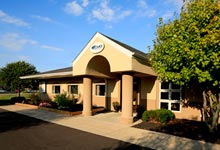Many people struggle with seeing clearly at night. This is particularly true under specific conditions. For instance, glare created by headlights on oncoming vehicles may result in temporary vision difficulties.
However, trouble seeing at night might be more severe. With night blindness, there are broader issues with seeing in the dark or in dimly lit spaces. If you’re wondering if your issues seeing at night are genuinely night blindness, here’s what you need to know.
What Is Night Blindness?
Night blindness – which is formally known as nyctalopia – is a vision impairment that results in poor vision when in dark or dimly lit spaces. It often leads to difficulties when driving at night, but it can also make dining in dim restaurants, moving through movie theaters, and similar situations hard to navigate.
Often, the issues are most noticeable when transitioning from a well-lit space to a darker one. For example, heading into a dimly lit restaurant on a bright, sunny day may cause struggles. Similarly, oncoming headlights or streetlamps along the road at night may result in definitive symptoms.
What Causes Problems with Night Vision?
Night blindness may occur for a variety of reasons. Certain medical conditions that impact how light moves through the eye are common examples. This can include anything from general nearsightedness to cataracts to retinitis pigmentosa.
In some cases, medications may result in night blindness, as the condition is a known potential side effect. Specific birth defects or genetic disorders – such as congenital stationary night blindness or Usher syndrome – may also cause the condition.
Temporary issues with night vision can also occur after vision correction surgery like Lasik. At times, a vitamin A deficiency may result in night blindness. However, this is generally rare and is more common in individuals with cystic fibrosis or conditions that cause pancreatic insufficiency.
Can You Correct Night Vision Issues?
Whether night blindness is correctable depends on the root cause. If nearsightedness is responsible, specific vision correction options – such as glasses or contacts – may solve the issue. For vision correction surgery-related night blindness, the situation may resolve after a patient fully heals from the procedure.
With cataracts, cataract removal surgery may restore night vision. If the issue is caused by a medication, switching to a new treatment can be effective. For vitamin A deficiencies, a supplement or diet change may work well.
However, night blindness related to other conditions may be uncorrectable. That’s the case for night blindness caused by specific birth defects or genetic disorders, such as retinitis pigmentosa.
When to See an Eye Care Provider
If you’re experiencing difficulty seeing at night or when transitioning from brightly lit to dim spaces, it’s best to schedule an appointment with your eye care provider. They can gather information and perform tests to determine if night blindness is occurring, its cause, and what treatment options are available based on the results.
At ECVA, the safety and health of our patients’ eyes are our priority. If you are experiencing symptoms of night blindness or simply haven’t seen your eye care provider in the past year, the ECVA team is here to help. Schedule an appointment at your closest ECVA clinic today.







